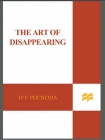The Art of Disappearing, Ivy Pochoda [best android ereader TXT] 📗

- Author: Ivy Pochoda
Book online «The Art of Disappearing, Ivy Pochoda [best android ereader TXT] 📗». Author Ivy Pochoda
His arms fluttered through the sky, rippling the solid darkness like a flip book. Then Toby grabbed the sand from around his feet, cast it into the air, and watched it rain down again. As they fell, the grains took the shape of wings extending from the magician’s body. The wings fluttered once before dissolving into the desert floor. Toby fanned his fingers wide against the sky and then snapped them shut. The sand rose up to meet him.
I was trembling. I knew he had a knack for producing saltshakers and seafood, but this was different. The whole desert seemed to be at my magician’s command. I wanted to draw closer, but did not want to disturb the dancing sand. Castles rose to my husband’s fingers. Then the sand took the form of enormous flowers. He made rivers flow and snowflakes fall. When his hands dropped to his sides and remained motionless, I ran toward Toby and wrapped my arms around him.
“That was astonishing,” I whispered, not wanting to disturb the magic in the desert air.
Toby’s hand slipped over my fingers, lingering for a second on my wedding band. When we returned to our suite, the turquoise stone had been replaced by one that captured the colors of the desert’s setting sun.
Three
I was born at home during a dramatic rise in temperature that transformed a blinding snowstorm into a flood. It was a freak occurrence, resulting in three days of heavy rain that ravaged our state. I know now that my brother, Max, was more pleased with the rapidly rising river than with his new sister. But it took me years to accept that he loved water more than he loved me.
Max was a water baby. Soon after he was born, my father decided that the best way to protect him from the river behind our house was to teach him to swim. On his first half birthday, my father took Max to the local pool. Holding him by the ankles, Achilles-like, my father eased my brother into the water. Max kicked free, dipped his face, and casually came up for air. My father applauded and promptly enrolled him in infant swim classes.
By the time he was three, Max was spending his evenings submerged in his bathwater, training himself to hold his breath for over a minute. By the time he was four, it was clear that Max preferred water to land. When no one was looking, he jumped into pools, fountains, even the ocean. At first my parents encouraged his swimming—driving him to pint-sized swim meets, timing while he held his breath underwater in the tub, taking him to the university to watch the Olympic trials. But when I was born, everything changed.
There had been no time to get to the hospital as the temperature began to rise, the barometer to fall, and the snow that had been predicted to last until the morning of my birthday gave way to torrential rain. So, with her Jiffy Pop belly about to burst, my mother rolled from the couch to the floor, and the water and I picked our moment to arrive. When I entered the world thirty hours ahead of schedule on our imitation oriental rug, my father swung me into the air, rescuing me from the floor that was already sagging under the weight of the creeping water.
My parents hadn’t considered that a house by a river might not be watertight. Ours was always ready to leak. Squirrels, termites, and carpenter ants had spent years snacking on the roof and the sills. Over time, the foundation had sunk into the river-dampened soil. If my parents had ventured into our shallow basement, they would have discovered an Alice in Wonderland–style Caucus-race among the chipmunks, squirrels, raccoons, and mice who circled a permanent puddle on the floor.
While we were growing up, my brother would often whisper to me about the way the water had worked its way in from the corners of the house, surged around the moldings, and sneaked in behind the carpet runners on the day I was born. He told me how it had slipped over doorjambs and seeped into the cracks of our imperfectly sealed floors. It had advanced slowly, he said, carefully lapping the cream-colored tassels on the edge of the rug. Then, like an orderly phalanx, it had begun its attack on the orange-and-blue carpet. Wave after wave of water had marched forward, sinking deep into the synthetic fibers, and finding no resistance, it had stayed for the night. And despite the fact that even now, if I close my eyes and roll myself into a ball, I can remember the damp welcome that greeted me before I was whisked from the rug and held above the rising water, I was never seduced by Max’s stories.
Max watched my arrival from between the peeling rungs of the banister on the second-floor landing, waiting for a moment when he might be left alone. He got his chance when the doctor arrived and transferred me and my mother to a bedroom upstairs. Max dashed out to the garden, tilted his head toward the sky, and let the icy rain slip across his face. He skipped across the cold, swampy lawn down to the river that had overflowed its banks. But as he dipped a toe into the rushing water, my father arrived, grabbed him by the collar, and swept him back to the house.
My mother spent the next three days in bed, listening to the rain that hadn’t taken a break since I was born. The light drizzle that tickled the roof and windows in the early evening became a full-strength assault, drumming





Comments (0)